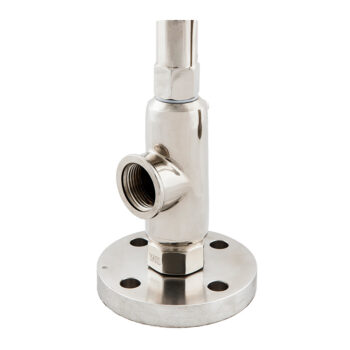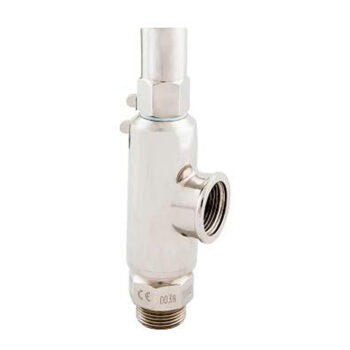Industries ➭ Street cleaning and waste management
The urban cleaning and waste management industry and the importance of waste in industrial processes.
what is the importance of use in urban cleaning and waste management?
Urban cleanliness and waste management are issues of great importance for the sustainable development of our cities. Urban cleanliness is the set of actions that are carried out to keep the city clean and free of waste. These actions include rubbish collection, cleaning of public spaces, maintenance of gardens and parks, etc. Waste management is the process of collecting and treating solid and liquid waste generated in the city. This includes the safe collection of waste, its proper treatment in treatment plants, its recycling and, failing that, its safe final disposal.
Companies like ZAES that manufacture safety valves, needle valves, manifolds, and instrumentation accessories are confident that to ensure the success of their manufacturing processes, they cannot hesitate to purchase reliable and certified products so as not to compromise the safety of industrial equipment and people.
Both actions contribute to improving the quality of life of the population by reducing the presence of waste in the urban environment. They also contribute to respect for the environment by reducing the impact of waste on soil, water and air. They also contribute to the economic development of the city by encouraging responsible consumption and the reuse and recycling of waste.
It is therefore necessary to promote urban cleanliness and proper waste management. This can be achieved through the establishment of appropriate policies, the training of responsible citizens and the promotion of citizen participation. This is the only way to achieve sustainable development of our cities.
The common uses in street cleaning and waste management in the industry include:
The collection and transport of solid urban waste is one of the most important tasks to keep the environment clean and healthy. This work is carried out with the aim of collecting waste from the city and taking it to the final disposal site.
In this process, municipal waste is collected in specialised containers or vehicles and taken to a treatment plant. There, the waste is separated according to its composition and then recycled, incinerated or sent to a landfill.
It is important to note that, in order to perform this task efficiently, local authorities must ensure that safety and health standards are met. This involves the proper selection of collection and transport equipment, as well as the supervision of established waste collection and disposal procedures.
This ensures a safe and efficient process for collecting and transporting municipal solid waste to the final disposal site. This contributes to maintaining a clean and healthy environment for the well-being of all the city's inhabitants.
Waste management is an important issue for the preservation of the environment. The classification of waste according to its type and its subsequent proper disposal are fundamental actions to reduce the impact caused by waste.
There are different types of waste, including organic waste, inorganic waste, hazardous waste, electronic waste, sanitary waste and construction and demolition waste. Each of these must be sorted appropriately for recycling, composting or treatment, as appropriate.
It is important to note that non-recyclable waste should not be mixed with recyclable waste. Hazardous waste should also be treated in a special way to reduce its toxicity.
It is therefore necessary that waste management is carried out in a responsible manner to avoid damage to the environment. Proper sorting of waste and its treatment according to its type is a fundamental step to achieve this.
Hazardous waste management must be carried out in a responsible and appropriate manner to avoid damage to the environment and human health. Therefore, it is necessary to have a series of practices in place to identify, store and transport hazardous waste safely.
Firstly, it is important to know the origin and nature of the waste in order to identify it correctly. This will allow hazardous waste to be classified and labelled according to its characteristics in order to avoid risk situations.
Once identified, hazardous waste should be safely stored in containers suitable for the type of waste and placed in appropriate storage areas. This will help to minimise the risks of contamination and accidents.
Finally, the transport of hazardous waste must comply with established regulations. It must be carried out safely and in compliance with emission limits to ensure the protection of human health and the environment.
In conclusion, the correct management of hazardous waste, including identification, storage and transport, is essential to prevent harm to human health and the environment. Therefore, it is necessary to comply with the relevant regulations and to carry out appropriate practices to ensure safe hazardous waste management.
Industrial waste management refers to a set of practices aimed at identifying, storing and transporting industrial waste for treatment and disposal. These practices aim to minimise the impact of waste on the environment.
First, industrial waste is identified and classified according to its origin, composition, volume and hazardousness. Once classified, the waste is stored in specialised containers to prevent its dispersion in the environment.
Finally, the waste is transported to an authorised facility for treatment and disposal. These practices are essential to ensure worker safety, air and water quality and ecological balance.
Street cleaning is one of the main factors in maintaining a healthy and pleasant city. Street sweeping and street cleaning is an important task to remove litter and debris. This helps to reduce pollution and improve air quality. It also improves road safety by reducing the amount of materials on the road.
Street sweeping and washing is carried out by specialised machinery with corresponding valves to remove waste and debris. This helps to keep the streets free of rubbish, dust and any other material that could be a health hazard.
Street sweeping and street washing also helps to improve the aesthetics of the city by providing a clean and tidy image. Street cleaning is an important task to keep the environment clean and safe.
The maintenance of green areas is important to promote the health and well-being of citizens. Parks and green spaces should be maintained and cleaned regularly to keep them attractive, safe and healthy for users. This includes litter and weed removal, as well as the removal of any other waste or debris that may damage the environment.
In addition, it is important to maintain vegetation and lawn areas to keep parks healthy and free of pests. Finally, parks and green spaces should be monitored to ensure that they are safe for users. This involves monitoring and controlling wild animals and preventing dangerous activities.
In conclusion, the maintenance of green areas is an integral part of maintaining the health and well-being of citizens.
Waste disposal services are essential for the proper functioning of a society. They involve the collection and transport of waste for subsequent proper disposal. Good waste management is key to preventing environmental degradation.
Waste collection and transportation services aim to collect household and commercial waste and transport it to appropriate treatment plants or disposal facilities. These facilities process waste in a safe and responsible manner to prevent damage to the environment.
Waste disposal services may also include recycling of materials that can still be used for other purposes. This helps to reduce the volume of waste generated and thus contributes to the conservation of natural resources.
Ultimately, waste disposal services are an essential part of environmental management. They allow waste to be disposed of safely and responsibly, ensuring the preservation of the environment for current and future generations.
Waste treatment is a fundamental process for environmental protection. The reduction of waste through the reduction of its size as well as the removal of harmful components before disposal contributes to the prevention of damage to human health and the environment. This is an essential practice to reduce land, air and water pollution.
In addition, waste treatment also helps to reduce the cost of final disposal. This is because treated waste is less bulky and requires less space for disposal. In this way resources can be used more efficiently.
Finally, waste treatment also contributes to the recovery of valuable materials. This allows materials such as metals, plastics and other materials to be recovered for reuse. This helps to reduce the use of natural resources and contributes to the conservation of resources.
In conclusion, waste treatment is an essential practice to prevent pollution and protect the environment. It also helps to reduce the cost of final disposal, as well as to recover valuable materials.
Urban cleaning and waste management in industry.
What is industrial waste management?
Industrial waste management is the management of waste generated by industrial activity to minimise the negative environmental impact it can have. This includes planning how waste is collected, transported, stored, treated and disposed of, as well as developing strategies to minimise waste production. This management is essential to ensure the health and safety of people as well as to protect the environment.
To ensure good industrial waste management, it is important that technical studies are carried out to determine the type of waste, the quantity and the appropriate form of management. In addition, the legal limits set by local and national authorities must be respected and the necessary measures to prevent soil, water and air pollution must be implemented.
Ultimately, industrial waste management is a complex process that requires careful planning to ensure that waste is handled safely and that negative environmental impacts are minimised.
How is the management of municipal waste carried out?
Urban waste management is a fundamental task in maintaining a healthy and pleasant environment for the population. It is a complex process that involves the collection, transport, treatment and final disposal of waste produced by human activity.
The first step in municipal waste management is collection. This task should be carried out by a specialised company or entity that has the necessary means to do the job efficiently. Once collected, the waste must be transported to a suitable place for treatment or disposal.
Waste treatment is an activity that must be carried out in accordance with current regulations. Depending on the type of waste, it can be recycled to obtain new materials, composted to turn it into fertiliser, or incinerated to reduce its volume.
Finally, once the waste has been treated, it must be disposed of in an appropriate manner. This includes the disposal of hazardous waste in appropriate facilities, and the disposal of non-hazardous waste in controlled landfills. In conclusion, municipal waste management is a fundamental task in maintaining a healthy and safe environment for all. This task must be carried out responsibly and conscientiously to avoid serious environmental problems.
What happens to the waste generated in industry and cities?
Waste generated in industry and cities is an increasingly complex problem. This waste results from the production of goods and services as well as from human activity. Waste can be hazardous to the environment and to health.
It is therefore necessary to take measures to properly manage this waste. These measures include improving product design to reduce waste generation, as well as recycling and composting products to minimise the amount of waste that is discarded.
It is also important to establish adequate infrastructure for waste management. This includes the construction of waste treatment facilities, the creation of waste collection systems and the establishment of education programmes for proper waste management.
It is essential to work with a long-term vision to ensure that waste is properly managed and damage to the environment is avoided. This can be achieved by establishing national and local policies that regulate waste management and disposal. In this way, we can ensure a healthier future for industry and cities.
What are the negative environmental consequences of municipal and industrial waste?
Municipal and industrial waste has a negative impact on the environment. Some of the main negative consequences are air, soil and water pollution, increased levels of carbon dioxide and other greenhouse gases in the atmosphere, destruction of terrestrial and marine ecosystems, and an increase in pollution-related diseases.
Urban waste and industrial waste can also lead to the destruction of biodiversity through the removal of wildlife habitats. This can have a huge impact on the health and well-being of local people.
Urban and industrial wastes also contribute to the accumulation of non-biodegradable wastes such as plastics, metals and other toxic materials in soil and water bodies. This can affect water quality and make it unsuitable for human use.
It is therefore essential for the environment to reduce, recycle and reuse municipal and industrial waste in an appropriate way. This will help to minimise pollution and harmful impacts on the environment.
What is industrial waste?
Industrial waste is the by-products generated by industry, such as chemicals, waste products, obsolete equipment or packaging materials. These wastes are produced as a result of industrial processes and are often contaminated with environmentally harmful substances.
Some common examples of industrial waste are waste oil, liquefied gas, waste metal, paper, plastic, tyres, chemical additives, oil filters, ink cartridges, waste electronic equipment, waste wood and waste paint waste.
These wastes can affect human health and the environment if not properly managed. Therefore, it is important that industrial waste control measures are taken to prevent pollution.
What actions is industry taking to reduce environmental degradation?
Modern industry has taken great responsibility for the deterioration of the environment and is working hard to find solutions to lessen the damage. These solutions focus mainly on pollution reduction and energy saving.
Firstly, many industries have opted for the elimination of the production of greenhouse gases such as carbon dioxide, methane and nitrous oxide. This is done through the use of renewable energies, such as solar and wind power, as well as reducing the use of fossil fuels.
Secondly, industry is striving to reduce chemical pollution and noise levels in the atmosphere. This is achieved through the development of clean technologies, such as advanced secondary combustion and wastewater treatment systems.
Finally, industry is working to promote the preservation of natural resources. This is achieved through the use of recycled materials, the reduction of waste and the protection of fragile ecosystems.
In short, modern industry is taking steps to reduce environmental degradation. These actions include the reduction of pollution, the use of clean energy and the responsible use of natural resources. These measures will help preserve the environment for future generations.





